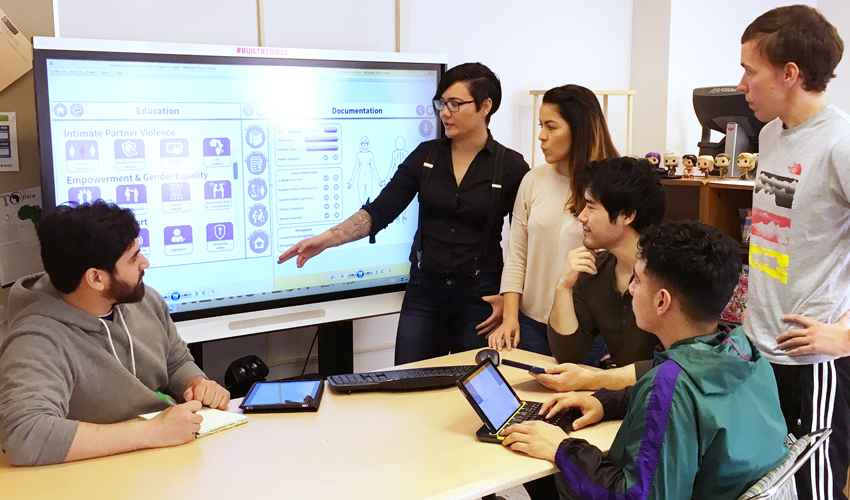Victims of intimate partner violence often suffer brain trauma

Professor Charmayne Hughes (gesturing) and project leader Tatiana Mariscal discuss the mPOWERED app with NeuroTech Lab students.
SF State’s NeuroTech Lab designs an app to better diagnose head injuries
Intimate partner violence (IPV) is a global public health issue: Up to 30 percent of all women report having been assaulted by current or former partners at least once in their lifetimes. But when these women are admitted to emergency rooms or outpatient clinics, they often receive inadequate treatment, especially when they have a head injury, says Charmayne Hughes, associate professor of kinesiology at San Francisco State University.
“If your partner throws you into a wall or punches you in the head or even strangles you, that can result in neurological changes,” says Hughes. “But when you go to the ER, the manifestations of the head trauma, such as issues with problem solving, agitation, or anger, are often attributed to the trauma itself — ‘she got in a fight’— rather than recognizing that these are actual brain injuries.”
Hughes and 11 student researchers in the Health Equity Institute’s NeuroTech Lab, which develops technical solutions to improve the lives of victims of violence and trauma, are analyzing data on 525,000 emergency room visits across the United States between 1992 and 2013, looking for records of women presenting with head, neck, and facial injuries (which often represent IPV injuries). Their analysis to date shows that approximately 281,116 women visit the emergency room each year for those types of injuries, according to Hughes. She adds that that number is probably an underestimate since many women do not seek medical care for IPV injuries and because women are not always diagnosed correctly.
The data analysis will inform an app Hughes and her students are developing, the mPOWERED system. The “m” in mPOWERED stands for mobile health, and POWERED represents the team’s desire to empower victims through better treatment. The software will run on a tablet and includes modules designed to educate health care providers about how to more thoroughly treat victims of IPV, document and evaluate their injuries, and refer them to other health care providers as needed.
Hughes hopes the app will help address misconceptions about intimate partner violence as well as lead to better long-term health outcomes. Right now, many victims of IPV are treated for bruises and broken bones (but not brain injuries) and sent home, where they are then at risk for repeated violence and additional brain injuries. The problem is magnified in places where intimate partner violence is explained away as being the victim’s fault, especially if cultural practices condone women being “disciplined” by their male partners. In sub-Saharan Africa, for example, 36 percent of women report being a victim of IPV at least once in their lifetimes.
“We need to be able to assess these kinds of injuries with more accuracy and also to bring recognition that this is an issue,” said Hughes. “Intimate partner violence makes people very uncomfortable; they don’t like to talk about it. I don’t know why, given how prevalent it is.”
mPOWERED will be presented in May at the IST-Africa (Innovation, Science and Technology) conference in Botswana. The lead author and researcher on the conference paper is graduate student Tatiana Lisset Mariscal, a 2017-2018 Sally Casanova Scholar. Mariscal says the most rewarding part of her work is mentoring undergraduate students about the impacts IPV can have at the individual, community and societal levels.
“My hope for mPOWERED is to see a fully functional version of the application being implemented in different communities and settings — emergency room departments, outpatient clinics and community centers,” said Mariscal. Her work in the lab will have a real-world impact: She plans to apply to a Ph.D. program in global public health and continue her work on brain injuries caused by IPV.